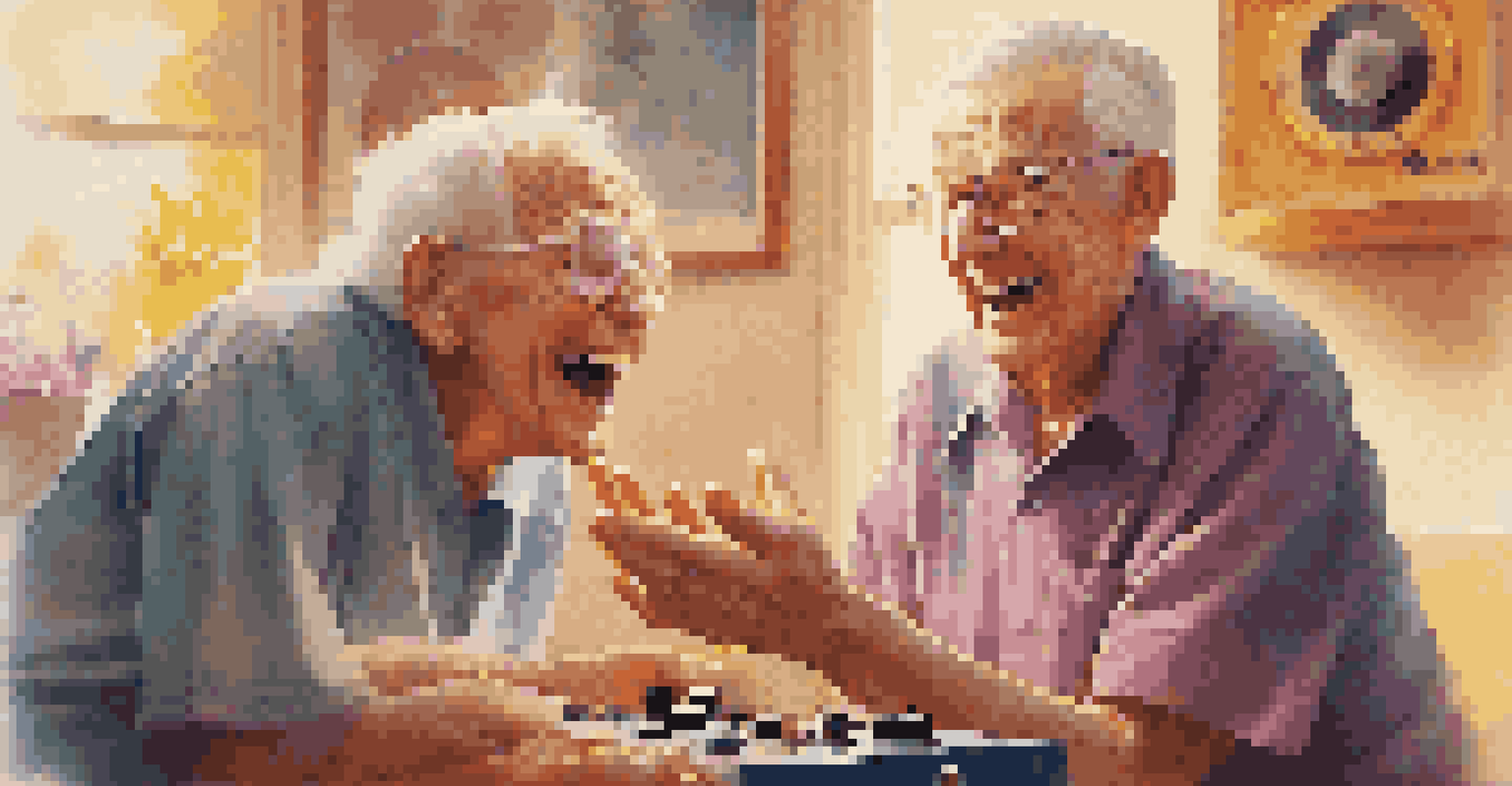Exploring the Therapeutic Use of Music in Memory Disorders

Understanding Memory Disorders and Their Impact
Memory disorders, such as Alzheimer's disease and dementia, significantly affect individuals' ability to recall information and engage with their surroundings. These conditions can lead to confusion, frustration, and a profound sense of loss for both patients and their families. Understanding the nuances of these disorders is crucial for developing effective therapeutic interventions.
Music can change the world because it can change people.
The impact of memory disorders extends beyond just the individual; caregivers often face emotional and physical challenges while providing support. This highlights the need for accessible therapies that can improve quality of life. Music therapy has emerged as a beacon of hope, providing a non-invasive and enjoyable way to connect with those experiencing memory loss.
As we explore the therapeutic use of music, we can see how it creates opportunities for communication and connection. This understanding allows us to appreciate the profound role music can play in enhancing emotional well-being and cognitive function.
The Science Behind Music and Memory Connection
Research suggests that music has a unique ability to stimulate brain areas associated with memory, emotion, and cognition. Even in advanced stages of memory disorders, familiar melodies can trigger memories and emotions that seem lost. This phenomenon occurs because music activates diverse neural pathways, often bypassing damaged areas of the brain.

For instance, a study found that patients with Alzheimer's showed improved memory recall when exposed to songs from their youth. It's as if these melodies serve as a time capsule, bringing individuals back to moments of joy and clarity. Such findings underscore the potential of music as a therapeutic tool.
Music's Role in Memory Recovery
Music therapy can evoke strong emotional responses and memories, aiding individuals with memory disorders in recalling cherished moments.
Understanding the scientific basis for music's impact on memory helps caregivers and healthcare professionals harness its power effectively. This knowledge enables the design of personalized music therapy sessions that cater to the specific memories and preferences of each individual.
How Music Therapy Works in Practice
Music therapy involves the use of music interventions to achieve specific therapeutic goals, such as improving cognitive function and enhancing emotional well-being. Therapists create tailored sessions that might include singing, listening to music, or even creating music together. The goal is to foster engagement and participation, making the experience enjoyable.
The music is a universal language, and it brings people together.
During sessions, therapists often observe how patients respond to different genres and tempos, adjusting the approach as needed. This flexibility allows for a more personalized experience, catering to the individual's unique preferences and memories. For example, a patient might light up at the sound of a classic rock song, prompting conversation about their youth.
The interactive nature of music therapy not only stimulates memory but also encourages social interaction and emotional expression. This holistic approach can lead to improved mood, reduced anxiety, and a greater sense of connection, both with oneself and with others.
Case Studies: Success Stories of Music Therapy
Numerous case studies highlight the transformative effects of music therapy on individuals with memory disorders. One such story involves a woman in the early stages of Alzheimer's who, through music sessions, was able to recall the names of family members and share cherished memories. These moments of recognition can be incredibly rewarding for both the patient and their loved ones.
Another case showcases a man who had become withdrawn and unresponsive until music therapy reignited his passion for singing. The joy he experienced not only improved his mood but also encouraged him to engage with his caregivers more actively. These success stories serve as powerful reminders of the potential of music as a therapeutic intervention.
Tailored Music Therapy Sessions
Personalized music therapy sessions enhance engagement by considering individual preferences and past experiences.
These real-life examples illustrate how music therapy can bridge the gap between loss and connection, fostering a sense of identity and purpose. As we learn from these experiences, it becomes clear that music holds the power to heal and uplift.
Choosing the Right Music for Therapy Sessions
Selecting the appropriate music for therapy sessions is crucial for maximizing its effectiveness. Familiar songs from a person's past often evoke strong emotional responses and can lead to meaningful conversations. Caregivers and therapists should consider the individual's age, cultural background, and personal preferences when curating playlists.
For example, a patient who grew up in the 1960s might respond positively to classic hits from that era, while someone with a different background may connect more with traditional folk songs. Understanding these nuances allows therapists to create a more engaging and enjoyable experience. It's essential to remember that the goal is to foster positive memories and emotions.
Additionally, therapists can incorporate a variety of genres to maintain interest and cater to changing moods. Whether it's soothing classical music for relaxation or upbeat tunes for energizing moments, the right choices can significantly enhance the therapeutic experience.
The Role of Caregivers in Music Therapy
Caregivers play a vital role in the success of music therapy for individuals with memory disorders. By participating in sessions, caregivers can help reinforce the emotional connections that music evokes. Their involvement not only supports the patient but also strengthens the bond between them, creating shared experiences that foster trust and understanding.
Moreover, caregivers can learn techniques from music therapists that they can apply at home. Simple activities, like singing favorite songs or playing musical instruments together, can enhance daily interactions and provide moments of joy. This ongoing engagement allows the therapeutic benefits of music to extend beyond formal sessions.
Caregivers Enhance Therapy Success
Active participation by caregivers in music therapy strengthens emotional connections and extends therapeutic benefits at home.
It's also important for caregivers to recognize the signs of emotional response during music therapy. Being attuned to these reactions can help them better support their loved ones and create a nurturing environment that encourages exploration and expression.
Looking Ahead: The Future of Music Therapy in Memory Care
As research on the therapeutic use of music continues to expand, the future of music therapy in memory care looks promising. Advances in technology, such as music apps and virtual reality experiences, are making it easier to implement music therapy in various settings. These innovations can enhance accessibility, allowing more individuals to benefit from music's healing power.
Furthermore, as awareness of the role of music therapy grows, more healthcare professionals are integrating it into their practices. This shift signifies a broader acceptance of holistic approaches to memory care, moving away from solely medication-based treatments. The focus on personalized, meaningful interactions is becoming increasingly valued.

Ultimately, the future of music therapy in memory care is bright, with the potential to transform lives and create lasting memories. As we continue to explore and understand its benefits, we can look forward to a more compassionate and engaging approach to supporting individuals with memory disorders.